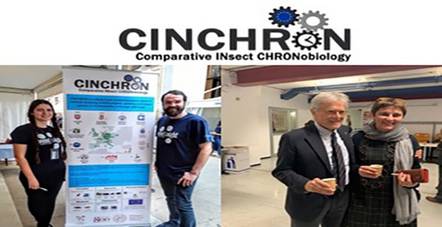
Comparative INsect CHRONobiology: Cinchron ITN project
Pubblicato il: 21.01.2020 11:49
Chronobiology is the study of biological rhythms. These are controlled by body clocks, which help organisms to adapt to the 24 h and seasonal cyclic environmental changes. Insects are important for basic research studies, fulfil valuable ecological roles in nature, and impact on both agricultural and industrial activities.
CINCHRON (grant agreement No 765937, cinchron.org) is a Marie Sklodowska-Curie funded European research network including 15 PhD projects, involving 11 Universities and 3 associate partners (across Europe and Israel) working on 7 insect species.
Within CINCHRON, the Department of Biology of Padova University (DiBio) is involved in two projects:
1) Mitochondrial metabolism and seasonality in Drosophila
(PhD student: Joanna Szramel; Supervisor: Rodolfo Costa; Internal Supervisor: Gabriella Mazzotta)
Mitochondrial uncoupling proteins (UCPs) play an important role in cold adaptation, and in fine-tuning energy metabolism. UCPs mediate mitochondrial thermogenesis in mammals. Whether they also exist in arthropods remains debated. We have already shown that the fruit fly bona fide UCP4C uncouples respiration only at larval stages, and is essential for survival at low temperatures. We are currently dissecting the signalling pathway that leads to UCP4C activation in vivo in both Drosophila and other pest species (i.e. D. suzukii) by a combination of biochemical and genetic approaches. Our aims are (1) to considerably advance the understanding of adaptive thermogenesis in arthropods, and (2) to define a strategy to control pest species, based on genetic manipulation of UCP4C.
RC Biography
RC’s scientific interests are the genetic/molecular features and the physiological/behavioural correlates of circadian and seasonal clocks. He is also involved in studies aimed at understanding the mechanisms underlying mitochondrial diseases. Past President of the Italian Association for Genetics (AGI), he is a member of the European Biological Rhythms Society (EBRS) and the American Society for Research on Biological Rhythms (SRBR). He also serves as the Editor in Chief of the specialty section Chronobiology of Frontiers in Physiology.
2) The Silkmoth clock
[PhD student: Daniel Brady; Supervisor: Federica Sandrelli, Co-supervisor: Silvia Cappellozza, Council for Agricultural Research and Economics, Research for Agriculture and Environment (CREA) centre, Padova Unit]
In several species, the circadian clock and photoperiod modulate the immune response, regulating sensitivity to infections across the 24 h day. We will explore whether a daily immune cycle (i.e. variations in immune function across the 24 hours) is present in the silkworm Bombyx mori when infected with pathogens, using transcriptomic approaches and the generation of clock mutants by CRISPR/Cas9 technology. This research, performed in collaboration with the CREA centre (Padova Unit), has also the additional, practical aim of characterizing optimal silkworm rearing conditions, with a view to reduce silk crop losses due to infections and thus maintaining high quality silk production.
FS Biography
FS is an Associate Professor of Genetics at DiBio, University of Padova. For several years, her research has focused on the molecular and functional analyses of behavioural genes in the fruit fly Drosophila melanogasterand other insects, with studies characterized by a multidisciplinary approach, including behavioural, cellular and molecular analyses. Since 2011, her research activity has also focused on the study of the innate immune response in insects. In line with these interests, she has been involved in both basic and translational research projects. She is a member of the European Biological Rhythms Society (EBRS) and the Italian Association for Genetics (AGI).





